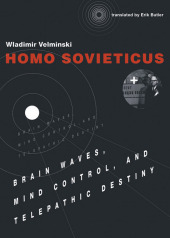 Neuerscheinungen 2017Stand: 2020-02-01 |
Schnellsuche
ISBN/Stichwort/Autor
|
Herderstraße 10
10625 Berlin
Tel.: 030 315 714 16
Fax 030 315 714 14
info@buchspektrum.de |

Erik Butler, Wladimir Velminski
(Beteiligte)
Homo Sovieticus
Brain Waves, Mind Control, and Telepathic Destiny
Übersetzung: Butler, Erik
2017. 128 S. 56 ill. 178 mm
Verlag/Jahr: MIT PRESS 2017
ISBN: 0-262-03569-3 (0262035693)
Neue ISBN: 978-0-262-03569-9 (9780262035699)
Preis und Lieferzeit: Bitte klicken
In October 1989, as the Cold War was ending and the Berlin Wall about to crumble, television viewers in the Soviet Union tuned in to the first of a series of unusual broadcasts. "Relax, let your thoughts wander free . . ." intoned the host, the physician and clinical psychotherapist Anatoly Mikhailovich Kashpirovsky. Moscow´s Channel One was attempting mass hypnosis over television, a therapeutic session aimed at reassuring citizens panicked over the ongoing political upheaval - and aimed at taking control of their responses to it. Incredibly enough, this last-ditch effort to rally the citizenry was the culmination of decades of official telepathic research, cybernetic simulations, and coded messages undertaken to reinforce ideological conformity. In Homo Sovieticus, the art and media scholar Wladimir Velminski explores these scientific and pseudoscientific efforts at mind control.
"Homo Sovieticus analyzes the convergence between culture and experimental science, the point at which mental energy becomes art through a series of relays from the laboratory to the studio. The book demonstrates that the Soviet New Man´ was missing a crucial limb: the brain. Its conditioning by scientists, politicians, and writers is the focus of Velminski´s study." - Sven Spieker, University of California, Santa Barbara
Wladimir Velminski is a Head of the Project History and Theory of Media Regimes in Eastern Europe in the Department of Media Studies at the Bauhaus University Weimar. Previously, Velminski worked at Humboldt-Universität zu Berlin, at the Universität Zürich, and at ETH Zürich.


